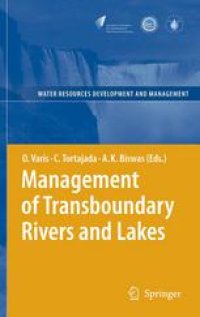
Ebook: Management of Transboundary Rivers and Lakes
- Tags: Environmental Management, Environmental Law/Policy/Ecojustice, Ecotoxicology, Nature Conservation, Waste Water Technology / Water Pollution Control / Water Management / Aquatic Pollution
- Series: Water Resources Development and Management
- Year: 2008
- Publisher: Springer-Verlag Berlin Heidelberg
- Edition: 1
- Language: English
- pdf
Water’s role in the nature is very fundamental. As it circulates in the atmosphere, in the rivers, lakes, soil, rock, and in the oceans, it is the major conveyer of va- ous chemical substances and of energy, and it can also be called as the blood of the ecosystems of this planet. But at the same time water is interwoven in the va- ous functions of the nature and the human society in countless ways which makes water one of the most complicated challenges of the mankind today. These ch- lenges call for seeing water in a broad development framework, pressed by a mix of demographic, social, environmental, technological and economic drivers. Human beings are exploiting and enjoying, but at the same time polluting and deteriorating, the waters in various ways and water is equally important to the - man socio-economic system as it is to the nature. It may sound a bit anecdotal to say that water obeys no borders, but that is true; the hydrologic cycle with its r- ers, river basins, lakes, aquifers, rainfalls, oceans, etc., cross administrational b- ders without any passport control. River and lake basins are in most cases very different from the administrational borders that the human beings have set up.
Transboundary rivers and lakes are often the remaining new sources of water that can be developed for human uses. These water sources were not utilized in the past because of the complexities associated with their development and management. However, as water scarcity increases, there are increasing social, economic and political pressures to utilize such water sources.
This unique and authoritative book analyses the magnitudes of the transboundary water problems in different parts of the world. It also examines difficulties and constraints faced to resolve these problems as well as successes and shortcomings to manage them. Written and edited by the world’s leading water and legal experts, this authoritative book analyses the present situations, both globally and in case specific basins. It also objectively reviews what management alternatives have worked and not worked and the reasons why.